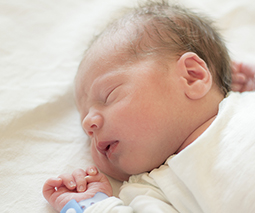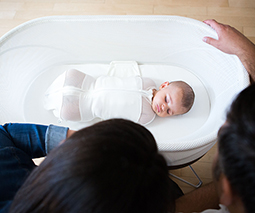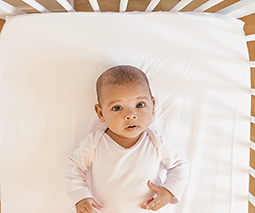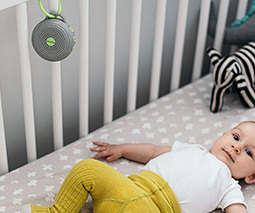Speed sleeper? How to cope when your baby only catnaps
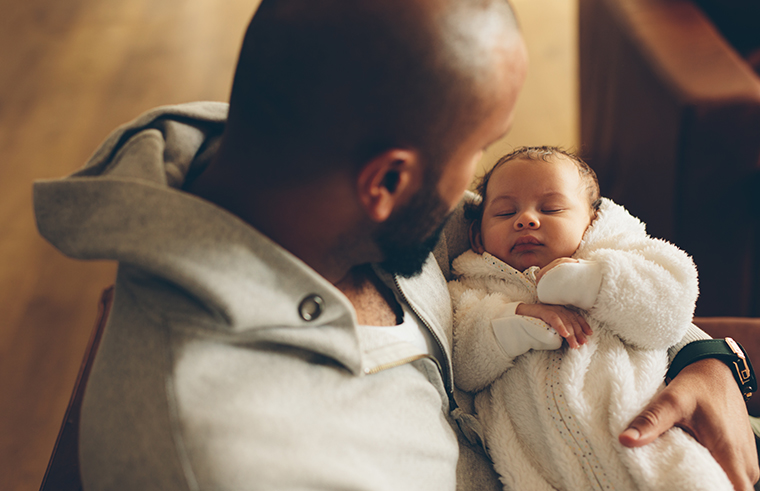
When my first son was a baby, I used to spend hours just pushing his pram around our neighbourhood. He was a catnapper and would only sleep in 20-40 minute bursts, unless he was snoozing in the moving pram or being rocked in my arms.
But it was so exhausting for me. Because while other mums in my mother’s group would catch some shut eye when their baby did, I was out pacing the streets like a zombie
Looking back, I know he wasn’t that unusual. Lots of babies are catnappers. If you very often have a wide awake little one, here are some tips for surviving her short sleep stints.
Know this is pretty normal baby behaviour
The first thing you need to remember when you have a catnapper is that it’s actually very common. While some mums in your mother’s group will have great sleepers, there are plenty of other parents who are also living with a catnapper.
Lots of babies will sleep like angels in mummy’s arms but ten minutes after being placed asleep in the cot? They will wake and cry out for you to cuddle her back to sleep. If you think about it from your little one’s point of view, this is pretty understandable. She’s programmed for survival and you are her source of warmth, food and everything else.

Understand her sleep cycles
One of the main reasons your baby is having short sleep bursts is because she’s having difficulty transitioning from a light sleep to a deep sleep on her own. For babies, a light sleep cycle is around 45 minutes, after which time she will stir – and may have trouble shifting into the next deep sleep phase.
You may find your catnapper has lots of short day sleeps to take the edge off, and then has a longer one in the afternoon or at night. Or you may find the catnapping happens at night, too. Yawn. Sob!
If your baby is growing and generally healthy, this sort of catnapping isn’t a medical cause for concern. She’s getting her quota of sleep, it’s just not in very long stretches. And yes, we feel your exhaustion.
Catnappers love/need sleep aids
Because a baby who can’t transition between sleep cycles often needs help to do so, she will cry out to be rocked, bounced, breast or bottle-fed back to sleep.
While much is written about the “problems” with sleep aids, it may be more constructive to acknowledge that some babies need a little more help than others to fall and stay asleep.
It’s also important to always do what feels right for you as a mum and what’s right for YOUR baby. If breastfeeding your catnapper back to sleep feels natural and works for you, then don’t beat yourself up about using it as a sleep technique. It may be what she needs right now.
Teaching her to transition between sleep cycles
That said, sleep deprivation is a killer and wears any new parent down. So what to do?
You can try extending her short naps by putting your baby to bed before she gets overtired. When she’s drowsy, she’ll be more likely to fall asleep on her own, and this will (hopefully) help her to learn that she can transition between sleep cycles too.
To do this, you’ll need to look out for her tell-tale sleepy signs: clenched fists, eye-rubbing, pulling of ears, droopy eyelids, hand-sucking, a vacant stare, yawning etc. Then strike while the iron’s hot and put her to bed. An overtired baby will generally be hyperactive, wide-eyed and may not look tired at all! When she has passed over to this stage, she will be harder to settle to sleep.
You can also do a preemptive strike, by putting her to bed when you know she should be tired (say after 60-90 minutes of awake time).
By helping her to learn how to fall asleep, she will hopefully get better at falling BACK to sleep when she wakes between cycles, and as a consequence, may have a longer sleep. If she doesn’t though, remind yourself that she’s little and she will learn to sleep longer. She may just need a little more time.

Try not to rush in
You can also try lengthening her short naps by not rushing in right away when she wakes after a short sleep. If she isn’t yelling out for you and is instead just fussing, try waiting before you rush in to her. Sometimes we need to give our little ones a chance at falling back to sleep on their own.
If you do go to her, then try shushing, singing or humming instead of immediately picking her up.
Buy a white noise machine
Many parents swear by a white noise machine for helping their to baby stay asleep. This noise is said to mimic that of the womb and is comforting to bubs.
For older babies, establish a good bedtime routine
While younger babies may not be across the whole, night time is for sleeping thing, older babies can start to get used to this by having a predictable evening routine. This may include a warm bath and books in bed, before a kiss goodnight. Being consistent with this will teach her that she’s in for the long sleep stretch.
Become a catnapper too
Then of course you may come to the conclusion, like I did, that catnapping is what your baby needs to do at this stage in her young life. As such, nothing you do may help her sleep longer, and it may be better to embrace her short sleep bursts and try to become a catnapper too.
Try to down tools as soon as she nods off and forget about your to-do-list. It’s amazing how refreshing a 20 minute power nap can be, even if it’s on the floor with your velcro baby. If you are convinced you won’t sleep, try lying down anyway. You may just nod off.
For those with an older toddler, catnapping when your baby does will be harder to do. This is when you need to ask for help from loved ones so you can sneak in some sleep while your toddler is with granny at the park and tag team with your partner on the weekends. The message is, call upon your village. It’s OK to ask for help.
Finally, try to accept that this is all a stage
If you are going around the twist trying to “crack” your baby’s catnapping habit, then it might be better to just stop. Rather than beat it, you may find it more positive to accept her sleep stage and look upon it as not lasting forever.
Your baby WILL sleep longer one day and as a result you WILL too. Hang in there tired mama, you are doing an amazing job. Life with a catnapper is hard, but this stage won’t last forever.
 Need some more baby sleep advice? Our Parent School sleep experts can help. Click to find out more or book a one-on-one session.
Need some more baby sleep advice? Our Parent School sleep experts can help. Click to find out more or book a one-on-one session.

